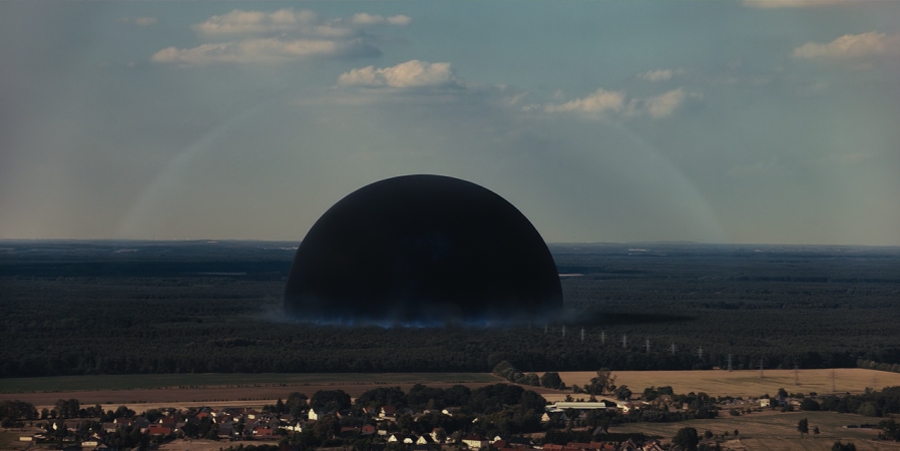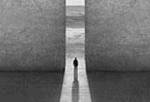
Very little to say, this time. Well, specifically. What I have to say will be more meandering.
Dark is still a very good product to watch. It’s all about the execution and the seriousness of the drama that makes it get away with its absurd conceits (there are a few… moments, this season).
This time (but also the first) I just didn’t want to put the effort to learn again who all those characters are, and their names. I remembered very little of this whole convoluted “who’s who”, whose son, who cheats on who, and so on. And I was right because after a few episodes the plot surfaces anyway and the little details foggily fall back. I just don’t care.
As the episodes go by, and the patterns clear out, I started to think it was all very, very predictable. Minute to minute it still keeps me engaged, the tension is always there, but then the episode is over and there’s not much left on the table.
Right up to the last minute of the last episode. Then I laughed. I also laughed at the finale of the second season of The OA, even if in that case it was much worse.
That last bit was not just predictable, but also clumsy. In season 1 we’ve seen the present and past being explored, then the season ended with a teaser of the future. So if with season 2 we have explored past, present and future… what’s left? Oh right.
The problem isn’t so much the bland predictability of this development, that becomes unexpected just because you don’t think possible they’ll make such an obvious move, but that season 2 as a whole is just a “filler”. Nothing being added. They just push on the pedal to show a bit better the potential of those rules they already established.
While waiting for Dark I started to watch “Lucifer” as a kind of pop-corn entertainment. And it does its job splendidly. It also underlines a pattern I don’t personally like, so here’s a quick rant: people bore me. I have enough of people. Dark is, essentially, soap opera with some sci-fi sprinkled over. The meat and bone of the show is still the boring people’s drama. People loving, people crying.
Even WORSE, season 2 of this show decided to write THIS into its mythology. Made this stupid “Adam” villain whose purpose is trying to make sense of the bad metaphysics. And so he explains how PEOPLE are moved by PASSIONS, the mechanics of PAIN and DESIRE. And how all this baggage essentially erases their FREE WILL and causes this time loop to be a fixed, immutable loop. Locking people into their behavior. You know, Bakker, but shallow:

Men being moved by their passions, by something that precedes them and on which they have no control, and so they aren’t ‘agents’, because they are moved by what comes before. …That all makes sense from the point of view of the science. We have now a tale of the world that does without human agency, where all matter flows equally. With no metaphysical intrusion. But more importantly, without any anthropocentrism. The recipe of the world needs to describe and entail the whole world, equally, without putting any human being on a privileged throne of being.
…And yet the show fails to conform with its goal, because again it needs to compromise for its public, and so fall back to relatable, anthropomorphic concepts. Like a villain. And so this pointless Adam that for some illogical reason represents the ‘beginning’, or a trigger. If “time” is truly god, as it’s been said at a certain point, then it again comprises everything. If this time loop is fixed and immutable, then there’s no epistemological distinction between minor and major events. Nothing changes, even minimally. And this same rule needs to apply even to a blade of grass being bent by the wind some kilometers away, unseen by all.
Got it? The process is the king. Without a distinction, without a beginning. Without an agent.
Thankfully this idea of Adam having some sort of privileged status has been discarded, at least for the time being. But during those dialogues between Jonas and Jonas (Adam), I kept wondering how the hell could he believe he could change anything, when season 1 already established and proved how ill-conceived was the idea. What’s different now? Nothing. And that’s why season 2 is filler. It just introduced this anthropocentric red-herring of believing this Adam character having some special feature. Some deus ex machina or, rather, man-privilege. Turns out, for the time being, he does not. So season 2 opens and closes its illogical hypothesis, and simply pushes its metaphysical dirt under the rug of a parallel world. Yay?
There’s something else, though. They haven’t just tried the anthropocentric angle (that really is just a variation of classic “dualism”, and consciousness being distinct from the physical), but also tried the ‘other’ way. One idea they briefly toyed with was the possibility of a new particle playing a role. A “God’s particle” that could somehow trigger some new, unprecedented effect. But once again the point is that it’s all a self-feeding process. Whatever particle is ALREADY part of the process. It doesn’t arrive into this picture as ‘new’ material able to somehow derail this train. Physics is part of physics. There is no ‘beginning’, or extraneousness to this process… Unless it comes from somewhere else… And only to be welded into the same, but much bigger structure overall.
When you use paradoxes, what makes them meaningful is their solution. Unless you are a magician who speculates on keeping the tricks hidden. Otherwise a paradox that is left as a paradox only hints at a logical fallacy. Something that doesn’t quite follow. During season 2 they mention a few times the ‘bootstrap paradox’ as something clever. They don’t even try providing a solution, as if they believe it’s the simple statement of a paradox that is meaningful, that makes it possible. The epistemological possibility of paradoxes.
There is an apple. There is a paradox.
But nope. That’s not how paradoxes ‘work’. The bootstrap paradox, for example, is solved in the classical ways of time travel. It’s a system of parallel worlds, working like branches. So what happens is that something, indeed, always has a causal origin. No rules are violated. When the loop is closed what’s left (visible) is only the loop itself. The origin, the root of the process, doesn’t cease to exist in the complete sense. It’s simply hidden away, out of reach. Hence this paradox isn’t a true paradox, but only the sleight of hand that hides the trick. That cuts away the logical explanation. It’s not about the existence of a paradox, but the fickleness of perception.
For Dark, we had the mechanics already established through season 1. Season 2, then, explored the possibility of finding exceptions to those rules, but failing. I was definitely intrigued when they were suggesting the possibility of those exceptions, but they were all revealed as empty and vain.
At its core, season 1 was built on a concept that just doesn’t hold up logically. There’s not much to add because season 2 just explores a few dead ends, and all its promises of showing something new are ultimately disregarded.
All this means that this season 2 is metaphysically inert, and I watch this stuff for this reason. And I’m bored of people drama, and there’s very little left beside that.
Lucifer, I was saying, isn’t all that different. We don’t get soap opera here, but we do get procedural. So same as Dark is soap opera with some sci-fi sprinkled over, Lucifer ends up as a procedural with some mythology sprinkled over, and thankfully a main character (and actor, really) that somewhat holds it all up. Here I am, watching these shows for what they have hidden in the gaps. The weird angles, that immediately disappear if you aren’t looking closely. Ghosts in the machine.
Lucifer (I was saying) does something you absolutely don’t expect. Because it does for the metaphysics way, way more than what “Dark” can do. It’s so much deeper and subtle, despite being hard to catch.
On one hand Dark promised so much, and delivered nothing, with some clumsy missteps that make me doubt it will ever get somewhere even with its announced third season. Lucifer instead promised absolutely nothing beside that pop-corn entertainment, but while juggling those metaphors it really does breach the fabric of reality. It really pushes past perception, playing with various layers and curtains. Make believe.
It seems I spend all my time complaining, but we do have some good stuff. The third season of Twin Peaks was metaphysically excellent, for example. Lucifer shows glimpses of genius (episode 6 of the 2nd season, an episode that is otherwise quite dull). Travelers was very good. Both The OA and Dark, despite being more ambitious, were mostly interesting failures.
Quick addendum:
There are a few things that Dark does better than Arrival, others less so. The metaphysics of Arrival worked so one who witnessed the future was then compelled to make it identical to how it was seen. So we can say that one was brought to ‘will’ that same future, in that exact way. In Dark instead we see characters desperately trying their best to CHANGE the course, and fail. Here the solution in Arrival is forced and artificial, but more logical. But Dark instead is more consistent with its presentation. By showing how a daughter can become the mother of her mother, they demonstrate that time is simultaneous, that it doesn’t develop through actual casual loops.

